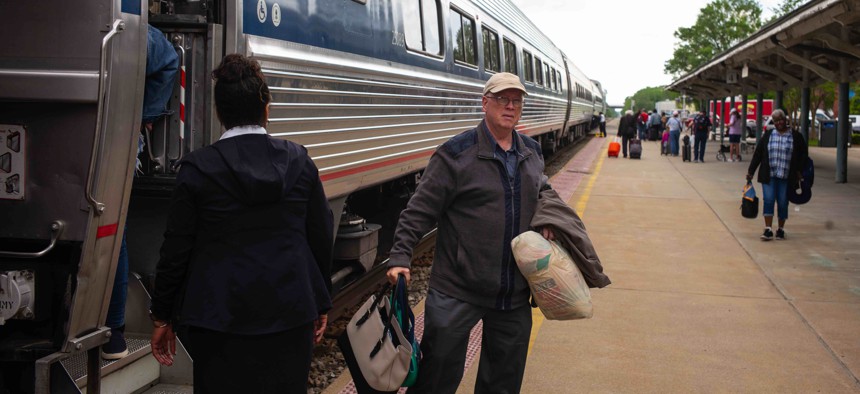All Aboard: Passenger Rail Is Rolling Along the Atlantic Coast

Passengers disembark an Amtrak passenger train in Wilson, North Carolina in 2019. Robert Nickelsberg/Getty Images
Two Southern states have set record-high ridership numbers and are looking to expand their networks. Here’s how they did it.
There’s a passenger rail boom happening on the Eastern Seaboard, and it’s not where you might think.
Amtrak’s Northeast Corridor may be the busiest rail corridor in the country, but it didn’t set record-high ridership numbers last year. That honor goes to Virginia and North Carolina, a fact that has emboldened both purple states to make aggressive plans for further expanding their networks with the help of new federal infrastructure grants.
The states had recovered nearly all of their pre-pandemic traffic in the last federal fiscal year, which ended in September. That stands in stark contrast to the Amtrak system overall, which was still nearly 30% lower than its fiscal 2019 ridership. And state-supported routes—like the ones Virginia and North Carolina run—all around the country fared even worse.
Recently, the two Southern states have posted several months of all-time-high ridership levels.
“Last year we had the highest ridership calendar year that we’ve ever had in our 32-year history of providing intercity railroad service here in North Carolina,” said Jason Orthner, the head of the rail division at the North Carolina Department of Transportation. The agency set new records for its NC By Train service again in January and February, too. “As we went back to full service in ’21, we started to see that folks were really choosing intercity passenger rail as a productive, safe mode of travel.”
The growth comes as states across the country are submitting to the Federal Railroad Administration corridors where they want to expand passenger service. Virginia and North Carolina will each be making the case for more investment in building out their local routes, and they’re working together on a proposal to build more capacity along a line linking Charlotte, North Carolina, to Washington, D.C. Those trains would run through Raleigh and Richmond, as well.
So, what’s been the key to their success?
The first thing that DJ Stadtler, the executive director of the Virginia Passenger Rail Authority, mentions isn’t better service, increased frequency of trains, the public’s climate concerns or any of the usual reasons rail proponents give for boosting service.
Instead, he says, it’s traffic. As in, “unsustainable highway traffic.”
The main interstates leading out of Washington, D.C. and into Richmond or Roanoke regularly come to a standstill. Getting in and out of the Norfolk area can be tough too because drawbridges open to let U.S. Navy ships go up and down the James River.
Widening highways won’t help. State officials discussed the idea of expanding those routes nearly a decade ago, Stadtler said. But they discovered it would cost $12 billion to do so, take 10 years to complete construction and, by the time they were done, congestion would be just as bad as when they started because of the state’s growing population.
Working With Freight Railroads Differently
Instead, Virginia has turned to passenger rail. But the way it has approached it has been unique.
Almost all passenger rail service in the United States outside of the Northeast Corridor and a stretch in Michigan runs over tracks owned by freight railroads. Federal law requires the freight railroads to give passenger trains priority on their networks, but, in practice, Amtrak trains can sit—sometimes for hours—waiting for freight trains to pass or for a track to open up.
Tensions have grown higher as the freight industry has adopted “precision railroading,” which uses longer freight trains and fewer tracks to minimize costs. That can make it harder for passenger trains to get by.
“Virginia approached the freights … and said, ‘Look, we know if we ask for more passenger trains, you’re going to tell us no, or else you’re going to make it horrifically expensive for us. So instead, what we would like to do is we would like to propose to you a win-win situation,’” Stadtler explains.
The state wanted to purchase right of way from freight railroads, so it could install passenger-only tracks at key chokepoints. It offered to pay for the necessary infrastructure, Stadtler says, in exchange for having the ability to schedule its own passenger trains.
Two years ago, former Gov. Ralph Northam signed a $3.7 billion deal with Amtrak and railroad CSX Transportation to add tracks in northern Virginia and build a new bridge into Washington, D.C. Then, Virginia bought land for tracks from Norfolk Southern to bring passenger service from Roanoke to the New River Valley, near Virginia Tech University.
“It is not inexpensive,” Stadtler said. “But it’s much more efficient, as we found out, than adding more lanes to the highway that have to continually be improved.”
The freight railroads thought the sales could help their operations, too, he added.
“You hear a lot of talk about passenger trains not being on time because of freights, but running a freight railroad isn’t easy, either, when you’ve got passenger trains trying to zip in and out all around you,” he explained.
In the meantime, Virginia is also expanding its existing services. It added a second train to Roanoke last year, doubling the frequency of service on the route. Virginia also added a train to downtown Richmond in 2021, and hopes to add more service in the city center, instead of to a more heavily used Richmond station that’s nearly eight miles and 30 minutes away by train from downtown.
The number of passengers on Virginia’s four state-supported routes was 28% higher in January than in January 2020. This February’s ridership was the highest on record, with nearly 54% more passengers than in February 2019.
Building a Brand, Locally
Passenger rail service in North Carolina is also breaking ridership records, but the state realized that growth by making mostly incremental improvements and focusing on smart marketing, said Orthner, the rail division chief there. That means improvements in rail stations, tie-ins with local events, and branding that emphasizes that the state service is run by North Carolina.
“What’s really changed is we have really stepped up the awareness of the service in recent years working with our communications team here, working on direct marketing and using social media a lot more effectively,” Orthner said.
The recent success of the state’s two existing lines has encouraged more North Carolina communities to bring rail service to their areas. Morehead City and Wilmington on the Atlantic coast, have pressed for service, as has Asheville in the Blue Ridge Mountains. The state is submitting several corridors to the Federal Railroad Administration for potential expansion.
The popularity of the current routes “has given folks in our state … a real sense of what it can do, both in the transportation aspect and in the economic development aspects of their communities,” Orthner said.
And support from communities can help the state transportation department make the case for passenger rail with state officials, whether they are Republican or Democrat, he added. “When we do it from a grassroots-up perspective and let the communities speak, it gets the attention of everybody.”
Daniel C. Vock is a senior reporter for Route Fifty based in Washington, D.C.
NEXT STORY: How chat comments can supercharge safety net programs






